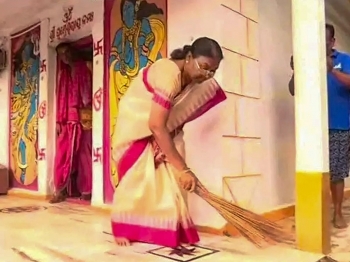
.png) Dr Suresh Mathew
Dr Suresh Mathew

Uparbeda is a nondescript tribal village in Odisha’s Mayurbhanj district. None had heard about it till recently. It was so neglected that its residents lived in darkness. All of a sudden ‘light’ came there after Draupadi Murmu, the Presidential candidate of the BJP-led NDA, filed her nomination papers. It is the ancestral village of Murmu. She was MLA twice; she was a Minister in the State government; she was Governor of Jharkhand. But the fate of the tribals in the village did not move an inch. The message is clear: The welfare of the tribals, Dalits and the marginalized does not happen merely because one or a few from among them come to hold important posts or portfolios. But things can drastically change overnight provided the government acts with determination.
The greatest tragedy of Indian democracy is lack of sincerity and resolve by the governments. Irrespective of the party in power, the fruits of development are cornered by certain privileged sections of the society. The benefits of many schemes do not percolate down to the Dalits, tribals and the poor. This is not polemics, but hard fact. On every parameter of development, these neglected sections find their place at the rock bottom. This is despite the representatives of these downtrodden sections holding top posts at every level of government, including constitutional posts, for decades. The imbalanced development is due to the governments’ lack of sincerity in implementing the laws meant for the betterment of the marginalized communities. Rather they throw the laws, and ethics too, out of the window.
Political parties find it easy to come to power and clutch on to it by indulging in symbolism and tokenism. Catapulting a Dalit to a top post is easier than implementing the SC and ST (Prevention of Atrocities) Act. Making a Tribal the President is an easier route to the hearts of the hapless people than executing the Forest Rights Act (FRA) that would restore ‘jal, jungle and jameen’ to them. Handing out ceremonial positions to a few is more ‘remunerative’ than trying to restore the livelihood provisions of the poor. The government thinks that it can curry favour with the marginalised by mesmerizing them with the glitter of a few posts and positions. One should not close eyes to the fact that those who wax eloquent on nominating a tribal to the top constitutional post made Stan Swamy, who spent decades of his life for the uplift of the tribals, to breath his last in custody. So much for the love and care of the government for the tribals.
The Opposition parties have, this time, desisted from falling in the trap of tokenism by nominating Yashwant Sinha as its consensus candidate. Though his winning chances are slim, he has made the right moves and appropriate statements. His remark that India does not need a rubber stamp President means that the country and its people will not gain by symbolic gestures. The Opposition, barring a few exceptions, has travelled an extra mile in unitedly proposing the name of Sinha. Though there are chinks in the Opposition ranks, the parties have to work on this new found unity and keep up the momentum to keep the democracy from falling in the trap of autocracy.